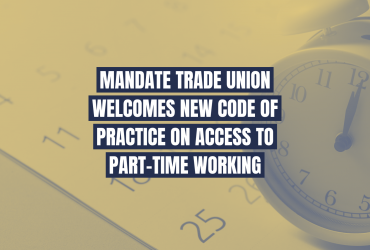Mandate Trade Union welcomes Joint Oireachtas Report on Low Pay
Wednesday 9 December 2015Mandate Trade Union has today (Wednesday, 9th December) welcomed the Report on Low Pay, Decent Work, and a Living Wage published by the Joint Oireachtas Committee on Jobs, Enterprise and Innovation.
The principle recommendations of the report is that the next government must prioritise ensuring workers get a living wage and the elimination of poverty at work.
In total, the Report has 28 recommendations for government, many of which Mandate and its members has advocated and fought for over the course of many years.
Gerry Light, Mandate Assistant General Secretary said: “The vast majority of the recommendations are very positive for trade unions and for the workers they represent. We now have evidence based research from the Limerick University in relation to low hour contracts and low pay. We also have a Joint Oireachtas Committee report that commits all political parties in the Oireachtas to the concept of a Living Wage.”
He added, “What we need now is a bit of political expediency to implement the recommendations of the University of Limerick Report and the Joint Oireachtas Committee Report. This would do an awful lot to improve the working conditions and living standards of tens of thousands of low paid workers.”
Mr Light said it was encouraging to hear Committee Chair Marcella Corcoran Kennedy TD state at the launch of the report that one of the key solutions to the issue of precarious work and low pay is legislative changes.
“It was especially heartening to hear Deputy Kennedy TD agree that legislative changes are needed to ensure workers have secure hours and earnings,” said Mr Light.
“The committee and the contents of the report have no doubt been influenced on the back of campaigns by Mandate members who have advocated very strongly on these issues. Credit must be given again to the brave Dunnes Stores workers who have brought this issue into the national spotlight,” he said.
“In Mandate we have argued that the Living Wage should not simply be based on an hourly rate of pay. It should factor in a workers entire weekly pay packet. In that context, it’s important that workers have contracts that reflect the hours that they actually work and that they have the ability to seek more hours should hours become available.”
Mr Light concluded, “Ireland has one of the highest levels of underemployment in the EU with more than 130,000 workers seeking more hours but being denied them by their employer. This is one of the main reasons we have such a high level of at-work poverty with one in six workers struggling to get by and experiencing deprivation.”
Senator David Cullinane, Rapporteur of the report said: “The challenge for all of us is how we build a more equitable Ireland based on a model of sustainable economic development.
“Low-pay, high childcare costs, high levels of debt and other factors have contributed to rising levels of poverty and when it comes to low pay, women are particularly affected, as are migrants, those with limited formal education, and young people.”
Addressing the question of possible increases in employers’ PRSI rates, Senator Cullinane said, “The employer groups who presented to the committee were very clear that it is not the role of employers to provide a living wage and they argued that the living wage is the role of the state. In order to ensure workers have an adequate income and decent public services we have to increase taxation where it is out of line with the rest of Europe, and that potentially includes employers’ PRSI.
Among other items, the report recommends the following:
- There is a need to look beyond an ‘hourly’ approach to addressing low pay, particularly given the increasing prevalence of insecure and non-fixed hour contracts.
- The state should become a living wage employer and that payment of the living wage should be stipulated as mandatory in government procurement contracts.
- The Low Pay Commission should include the living wage as a key target and explore how it can be reached when making its recommendation of an appropriate minimum wage.
- The Low Pay Commission should consider the findings of the Irish Living Wage Technical Group to make the minimum wage a Living Wage by increases in the minimum wage and investment in public services.
- The Government should recognise that the concept of a Living Wage has an important role to play in addressing persistent income inequality and poverty levels.
- The Oireachtas continue to recognise and support the important role of trade unions in achieving decent working pay and conditions for all workers.
- The Committee recommends the Oireachtas ensure that all workers are covered by a collective agreement.
- The Joint Labour Committee structure should be strengthened to give workers the opportunity to influence their working conditions and ensure they get proper, decent and regular hours of work.
- A sustainable employer and employee rate of PRSI to enable the state to invest in public services (particularly housing, childcare, and healthcare).
- The committee recommends that the government set a goal for the elimination of low pay.






